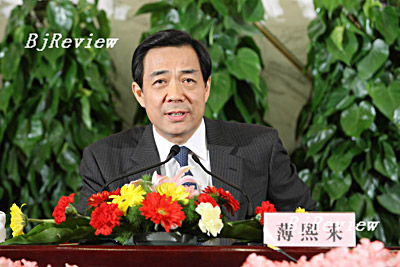
China resolutely opposes a tariff increase of 27.5 percent on Chinese goods, which was proposed by some US lawmakers, Commerce Minister Bo Xilai said on Monday, adding such an increase will be destructive to healthy bilateral trade.
"If implemented, such a policy is more than protectionism and becomes hegemonism," the minister said at a press conference on the sidelines of the parliament's annual session.
China's trade surplus with the United States exceeded US$140 billion last year, sparking strong response from the US Congress and media.
Some US lawmakers proposed a 27.5 percent increase in tariff on all Chinese goods and suggested the most-favored-nation treatment for China be revoked, unless China makes major reforms and changes on foreign exchange policies.
However, the Chinese commerce minister said the proposals are in breach of the World Trade Organization (WTO) agreements, while in bilateral trade "China has the surplus while the United States has the profits."
"The US traders are wise and we have no grounds for suspicion. They will not do business with China if they can not make profits," Bo said.
He said the development of Sino-US trade is healthy and traders from both sides have reached a mutual beneficial and win- win relationship.
The minister said US trade deficit with China partly resulted from a transfer of its deficit with Japan and the Republic of Korea amid the development of processing trade in China.
Global business activities have kept growing after China's entry into the WTO, while trade frictions between China and some of its trade partners, especially Europe and the United States, are also on the rise, the minister noted.
China prefers to resort to consultations for the settlement of trade frictions with its trade partners, he said.
China's trade surplus reached US$177.47 billion in 2006, with foreign trade totaling US$1.76 trillion, up 23.8 percent year-on-year.
China will strive to reduce its "excessively large" trade surplus to ensure the sustained development of both domestic economy and foreign trade this year, said Premier Wen Jiabao on March 5 at the opening of annual full session of the 10th National People's Congress (NPC), the top legislature.
Wen said the government will limit export of products whose manufacture is highly energy consuming or highly polluting while supporting the export of high value-added products and products with Chinese trademarks, upgrading the processing trade and expanding the export of service and agricultural products.
China will keep improving the mechanism for setting the Yuan exchange rate, easing the imbalance in international payment and optimizing foreign investment environment, the premier added.
(Xinhua News Agency March 12, 2007)
| 